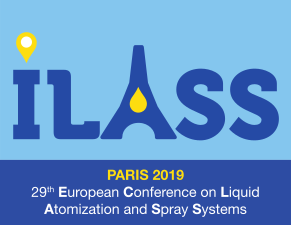Bio-alcohols, especially methanol, ethanol, butanol have received a lot of attention as potential future alternative fuels to pure gasoline. Even if bio-butanol has several advantages compared to ethanol and methanol, the main issue preventing n-butanol's use in modern engines is its relatively high production and energy costs. But Acetone-Butanol-Ethanol (ABE), the intermediate product from the fermentation process for bio-butanol production, is more and more considering as another alternative fuel. In this paper, the experimental study of spray and combustion processes of ABE blends with gasoline surrogate (Primary Reference Fuel 80) was performed under high-pressure and high-temperature controlled conditions in a reactive atmosphere, similar to compression ignition conditions before start of combustion, as defined in Engine Combustion Network. These first experimental results indicate that both ignition delay and lift off length increase with the increase of ABE ratio in PRF80 blends. As longer is the ignition delay of ABE blends as leaner is the mixture at the ignition time, inducing stronger premixed combustion phase and therefore shorter combustion duration.
|
|
|
|
effect of butanol and ABE blend on PRF80 spray behavior
1 : Laboratoire PRISME
(PRISME)
Université d'Orléans : EA4229, ENSI Bourges
8, rue Léonard de Vinci 45072 Orléans Cédex 2 -
France
2 : Laboratoire PRISME
Université d'Orléans : EA4229, ENSI Bourges
8, rue Léonard de Vinci 45072 Orléans Cédex 2 -
France
|
| Online user: 60 | RSS Feed |

|


